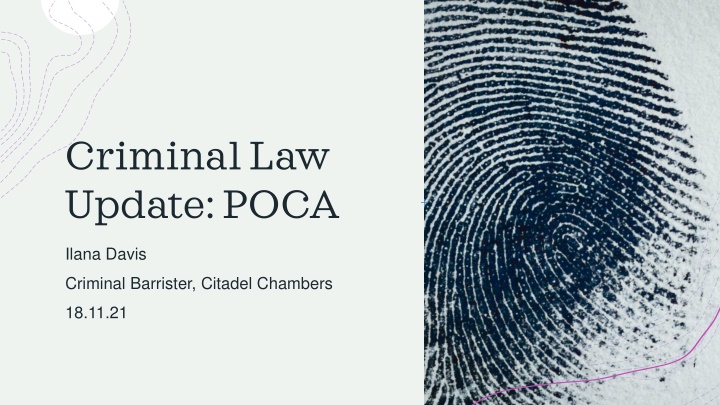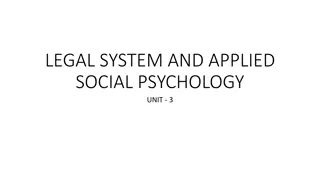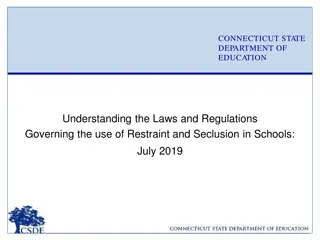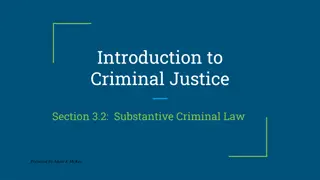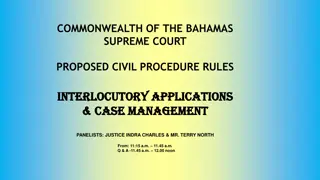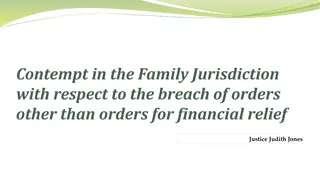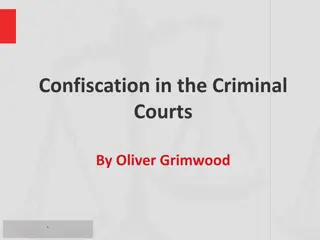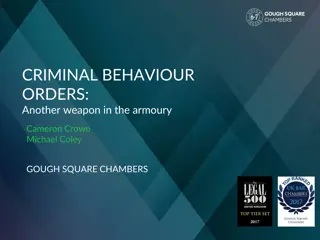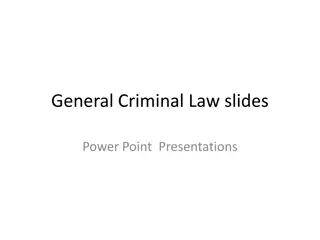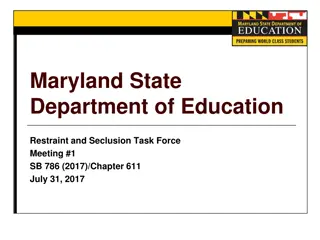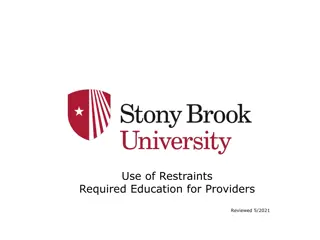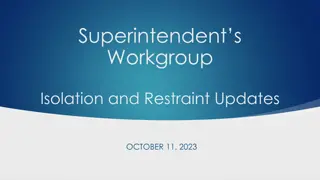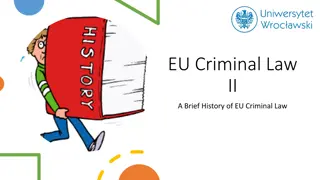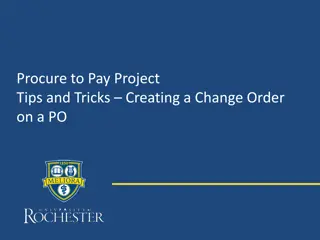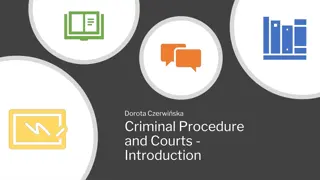Overview of POCA Applications and Restraint Orders in Criminal Law
This collection of information delves into the application of Proceeds of Crime Act (POCA) in criminal investigations, focusing on topics such as Restraint Orders, Discharge, POCA Timetable, Benefit Figures, Available Amount determination, Making Confiscation Orders, Enforcement, Enforcement Receivers, and Variation of Available Amounts. It also discusses relevant cases highlighting the importance of maintaining the value of realizable property to satisfy confiscation orders and considerations for reasonable living expenses during investigations.
Download Presentation

Please find below an Image/Link to download the presentation.
The content on the website is provided AS IS for your information and personal use only. It may not be sold, licensed, or shared on other websites without obtaining consent from the author.If you encounter any issues during the download, it is possible that the publisher has removed the file from their server.
You are allowed to download the files provided on this website for personal or commercial use, subject to the condition that they are used lawfully. All files are the property of their respective owners.
The content on the website is provided AS IS for your information and personal use only. It may not be sold, licensed, or shared on other websites without obtaining consent from the author.
E N D
Presentation Transcript
Criminal Law Update: POCA Ilana Davis Criminal Barrister, Citadel Chambers 18.11.21
+ Application Restraint Orders + Discharge + POCA timetable + Benefit figure Pre-Enforcement + Available amount + Making the confiscation order Enforcement + Enforcement receivers + Variation of available amount
Restraint Orders A court order prohibiting someone from dealing with any realizable property held by them
Application [ss40 41] 1. A criminal investigation has been started 2. Proceedings for an offence have been started in England & Wales 3. An application by the prosecutor has been made under section 19, 20, 27 or 28 [reconsideration when no confiscation order has been made or D absconds] 4. An application by the prosecutor has been made under section 21 and not concluded [reconsideration of benefit] 5. An application by the prosecutor has been made under section 22 and not concluded [reconsideration of available amount]
Luckhurst and Golding (intervenor) [2020] EWCA Crim 1579 Real risk of injustice if D could reduce the value of his proceeds of crime by spending on living expenses without some objective limit of reasonableness Reasonable living expenses and reasonable legal expenses Value of realizable property should be maintained so that it is available to pay a confiscation order It would be contrary to the whole scheme and purposes of POCA if D acquired a lavish lifestyle through crime and was permitted to continue that lavish lifestyle while under investigation or awaiting conviction
What is reasonable? Factors to consider Necessary or desirable to improve or maintain value of assets Diminish the restrained assets below likely level of confiscation order Standard of living enjoyed by D before restraint order Means Duration of order Prima facie case that the existing standard of living was the result of crime Amount of expenditure sought Other unrestrained assets available
Was his application allowed? +No. Cannot keep the BMW in addition to his wife s car. Wife could fund the repayments. +No. Not living expenses incurred on credit from suppliers of goods and services. Not possible to tell what sums were spent on. Could be repaid by wife. +No. No evidence they were D s liabilities. Did not enhance value of property by an equivalent amount. Wife s assets were available to meet those expenses. +Yes. No bar on paying reasonable legal expenditure in civil proceedings merely because they were based on the same facts that the criminal proceedings.
The person who applied for the restraint order or any person affected by the order may apply to discharge it Must discharge the order if, within a reasonable time, proceedings for the offence are not started or the anticipate application has not been made Discharge [s42] Must discharge the order upon conclusion of proceedings or the application
Pre-Enforcement + POCA timetable + Benefit figure + Available amount + Making the confiscation order
POCA Timetable Stage Description s18 statement D lists all assets, liabilities and income s16 statement Prosecution set out their case in terms of the benefit figure and available amount s17 statement D response to prosecution s case, what they accept, dispute and evidence in support Mention Parties negotiate to agree a confiscation order Final Hearing If parties cannot agree, a hearing is listed for a judge to hear evidence from both parties and decide the benefit and available amount
Benefit figure D s benefit from their crime
1. Any property transferred to D within 6 years ending on the day on which proceedings were started was obtained by him as a result of crime If D has a criminal lifestyle , assumptions apply about D s benefit from crime: 2. Any property held by D at any time after the date of conviction was obtained as a result of crime 3. Any expenditure incurred by D within 6 years ending on the day on which proceedings were started was met from criminal property 4. Any property obtained or assumed to have been obtained by D was free of any other interest in the property
Calculating Benefit Roth (Boruch) [2020] EWCA Crim 967 +Rent derived from letting flats that had been converted without planning permission +Had D complied with the enforcement notice to cease the lease of the properties then he would not have received the benefit of the rent Lowther [2020] EWCA Crim 1387 +Value of a property for the benefit calculation does not take into account the costs of sale; it is just the market value of the property +For the recoverable amount, costs of sale are deducted
Proportionality Andrewes [2020] EWCA Crim 1055 +Obtained a job through fraud +Worked well in the job and given proper consideration/value for the money he received in his wages +It would be punitive if he had to pay back all of his wages for his 10 years service
Available amount Total value of all of D s free property and tainted gifts
Failure to draw up a written order does not render the order a nullity Westbrook [2020] EWCA Crim 1243 +Oct 2018 = confiscation order made orally +Nov 2018 = appeal made; Court of Appeal office say that there is no order to appeal +Aug 2019 = written confiscation order made for 124k +Sept 2019 = written confiscation order made for 125k +D appealed against the making of the confiscation order Court of Appeal: D had been aware of the oral confiscation order when it was made originally, as evidenced by his first attempt to appeal against it in Nov 2018 so it cannot be suggested that the order was not valid
Financial orders made upon conclusion of POCA proceedings e.g. victim surcharge, costs, compensation Bristowe [2019] EWCA Crim 2005 +If made before conclusion of proceedings, they will not generally be quashed by the Court of Appeal unless, exceptionally, the final outcome of the case means that the circumstances and justice make this necessary +e.g. if D does not have the means to pay the victim surcharge, Judge can waive it or order that it be paid out of the confiscation order
Third Party Interests [s10A] Hilton [2020] UKSC 29 +No duty to proceed under s10A in every case that a third-party interest arises +Third-party interests can be accounted for during enforcement proceedings +Parliament s intention was that making a confiscation order was to be straightforward and quasi- automatic Forte (Michael) [2020] EWCA Crim 1455 +If there was a significant difference in D s position compared to a third party, Judge can decide to have a contested hearing to determine all of the issues and establish who owns what
Matrimonial Property Property jointly purchased by a couple before criminality was committed by 1 of them
Gibson v Revenue and Customs Prosecution Office [2008] EWCA Civ 645 +Wife was fully aware of D s criminality +No public policy jurisdiction entitling a court to confiscate at wife s 50% beneficial interest in various assets owned by her and D, against whom a confiscation order had been made Bevan (Jeffrey) [2020] EWCA Crim 1345 +Impermissible to adjust D s interest away from legal and beneficial ownership and the parties mutual agreement by appealing to fairness or public policy principles of depriving offenders of the proceeds of their criminality +If the prosecution wanted to seek more than half of the house as D s interest, they needed to apply the principles of tainted gifts
Tainted gifts A gift is tainted if: a) It was made by D within 6 years ending on the day on which proceedings were started b) The property subject of the gift was obtained by D through crime c) It was made by D any time after the offence
Making the confiscation order a) Benefit Amount 10k or less 10k 500k 500k 1 million 1 million or more Maximum Term 6 months 5 years 7 years 14 years b) Available amount c) Time to pay (up to 3 months) d) Default period
Enforcement Default period Enforcement receivers Variation of available amount
Enforcement Receivers A prosecutor can apply to the Crown Court to appoint an enforcement receiver to take control of D s recoverable assets and liquidate them to pay the confiscation order [s51]
Powers of an Enforcement Receiver Powers [s51(2)] a) Take possession of property b) Manage or otherwise deal with property c) Realise the property, in such manner as the court may specify d) Power to start, carry on or defend any legal proceedings in respect of any property Application of property [s54(2)] 1. Expenses incurred by a person acting as an insolvency practitioner 2. Make payments directed by the Crown Court e.g. compensation 3. Confiscation order This is also where a third-party interest can be taken into account during enforcement [s54(4)].
Variation of available amount Prosecution [s22] +Increase available amount +Usually when D has come into money e.g. inheritance, won the lottery, equity increased in property Defence [s23] +Decrease available amount +Usually when assets have been liquidated that did not achieve the anticipated price e.g. a house sells for less than anticipated on the market
Any questions? Ilana Davis Barrister, Citadel Chambers ilana.davis@citadelchambers.com
